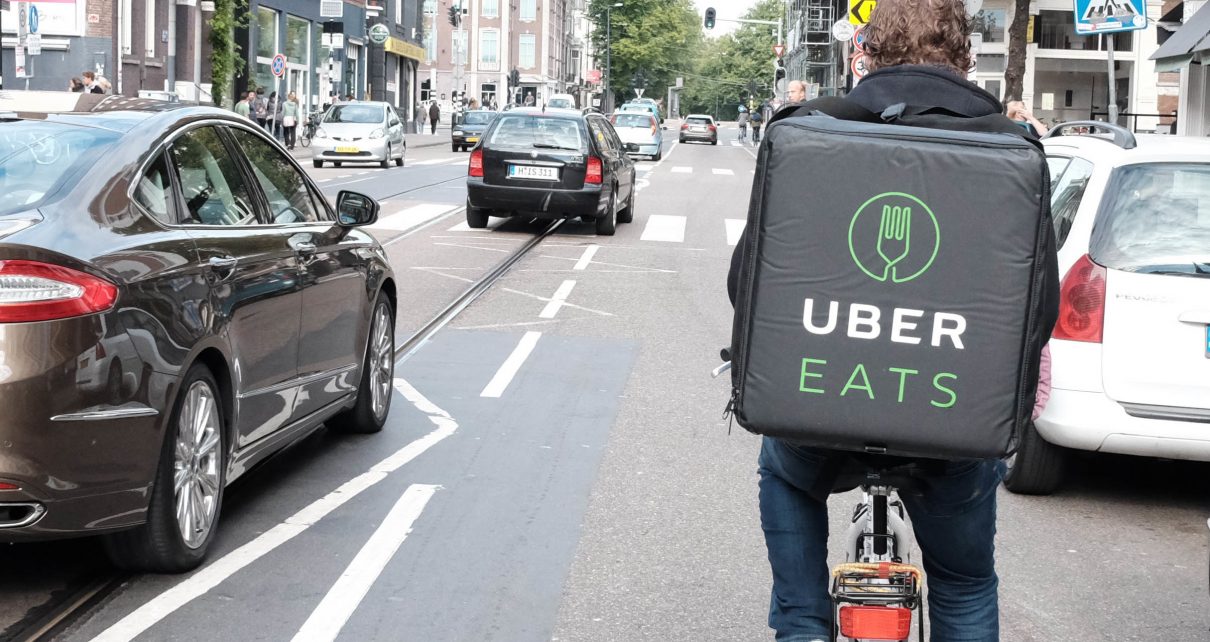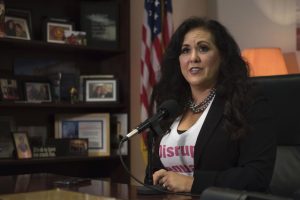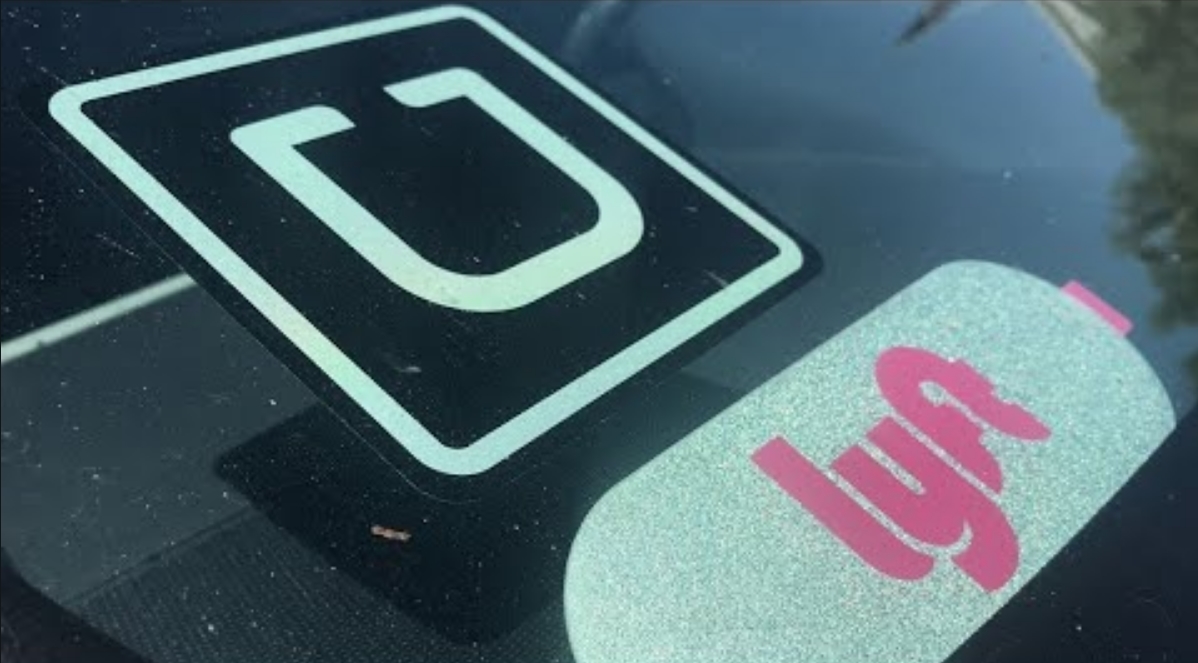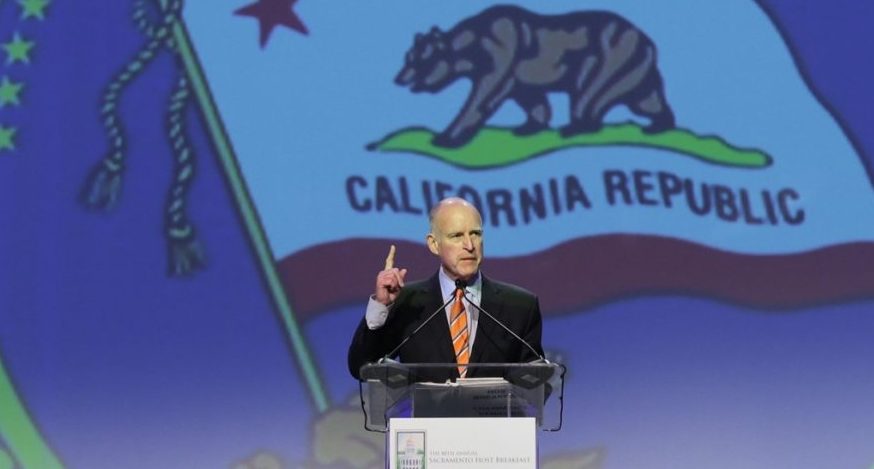
Food delivery UberEats. (Photo: Wikipedia)
Why This Gig Worker Opposes Prop 22
AB5 went too far, but ride-share giants still exploit workers
By Laura Hauther, October 20, 2020 3:09 pm
The way we work transformed this year, probably forever. We face an unprecedented level of uncertainty, with COVID adding a new level of disruption to the already-changing employment landscape, and the stakes are higher than ever for workers and business owners.
California implemented a new law in January, AB5, affecting the employment status of the state’s abundant independent contractors. That timing that could not have been worse for workers or the law’s supporters. The law dictated that in California, independent contractors (like me) had to be treated like employees or we were out of a job. Converting someone from an independent contractor to employee is estimated by BusinessWeek to cost 30% more when all taxes and benefits are added to the wage.
Business owners had to decide how many workers they could afford to keep and if their business could still afford to stay open if all former independent contractors had to be treated like employees. Employees had to decide if working under more direct control of their employer was what they wanted; many preferred to keep the flexibility and freedom independent contracting allowed.
AB5 originally had no provision for flexible and occasional workers of any kind: writers, yoga teachers, wedding planners, caterers, photographers, musicians and yes, rideshare drivers, all now had to be employees. Any job of any length, even a single day, had to be brought on with full employee status and all the paperwork and obligations that come with it.
As a former union member, I had all the benefits and protection and paid the full freight membership dues to support that union and its political work. But now I found myself at odds with the union’s response to recent major changes in employment law.
Conservative justices overturned four decades of settled law in 2018 by allowing workers covered under a union contract to stop paying any fees whatsoever to support any union activities, including labor negotiations. The 1977 ruling in Abood v. Detroit Board of Education required workers to pay only contract negotiation fees, but allowed them to opt out of any contributions toward union organizing or political efforts.
Government union workers now have to affirmatively agree to contribute to their union, and understandably unions feared a disastrous drop in membership and funding, although that fear so far has largely has not come to pass.
But fearing decreasing membership and revenue, unions hoped that in California, where a court had already strengthened rules against worker misclassification in the 2018 Dynamex decision, AB5 would create more employees—and those employees might be willing to join a union to bargain collectively. Rideshare workers are at the top of that wish list.
In that context, strong union backing for the sweeping nature of AB5 makes more sense. As more workers are absorbed into the gig economy, companies are avoiding the costs and worker protections that come with hiring workers as employees as opposed to independent contractors. But contract work also means flexibility that can be an advantage for workers.
AB5’s one-size-fits-all solution didn’t solve the problem
Despite all the benefits from my years of union membership, I still couldn’t support AB5. Not only was AB5 threatening my current independent contractor jobs, it was a huge blow to many creatives. Small theaters, publications, and music venues were afraid of going under and California musicians and writers were getting cut out of work.
Julie Carpenter, a member of a small group of composers and musicians, said AB5 gave them the final push to establish a Limited Liability Corporation (LLC).
“We have some production company clients who said we aren’t hiring composers from California anymore…because we’re concerned with AB5 and having to treat them as employees.”
Many musicians aren’t able to navigate the intricate legal paperwork and expense of incorporating to get around that barrier–and it simply doesn’t make sense for a venue to hire each band as an employee for a single night of performing.
Ari’s Take , a blog about the music industry, wrote extensively about the impact of AB5 and the fight to pass AB2257, a fix-it law to exempt more categories of work to alleviate some of the problems caused by AB5’s heavy-handed approach. (California Globe covered this battle.)

AB 2257 only passed in early September after months of Twitter battles, Facebook organizing, and lobbying by a coalition of conservative and liberal workers and employers. The economic sledgehammer that is the pandemic no doubt played a role in how quickly the law passed, with so many workers and businesses begging for relief as unemployment rolls continued to swell.
AB5 was the creation of Lorena Gonzales, a California assemblywomen who famously loves a good fight. She sees herself as champion of working people, but resisted opposition to her methods from the very people she’s trying to help. Any criticism inspired Gonzales to dismiss the opposition as anti-worker Republicans and Trump supporters. It’s just not a good strategy to ignore the voices of working men and women who would have her back in most of her positions.
All three of my current sources of income fell under the new AB5 rule, and it wasn’t until AB2257 passed that restrictions on one of them – freelance writing – were lifted. Writers and journalist faced the same problem musicians did–if companies could hire from anywhere in the world, why would they deal with the legal complexities of hiring in California?
With pandemic restrictions, many jobs were eliminated or transformed, leaving most of us leaning on whatever work was available in the midst of the shutdown.
Then Prop 22 showed up on the ballot and it has me swinging back in the other direction. Not only is it the most expensive proposition in the history of propositions, but the nearly $200 million spent to push it through came from the companies that would have to change their gig workers to employees: Uber, Lyft, Doordash, Postmates, and Instacart.
Those spending figures don’t even include those companies sending pro-Prop 22 messages to their customer base via email, text, and even as pop-ups when booking a ride.
The opposition’s purse, even with money from unions, amounts to a measly $14 million.
Together those gig economy companies had the political clout to push back on the Court’s demand they classify their workers as employees. They threatened to pull out of California altogether until a state appeal court ordered a stay until the voters get their say via Prop 22.
But it was Uber software engineer Kurt Nelson’s op ed in Tech Crunch that pushed me toward opposing Prop 22. Nelson had worked both as a Lyft driver and with a food delivery app, in part to get a ground level worker’s point of view.
Nelson writes that “it’s become clear to me that [rideshare companies are] only possible because countless drivers are spending their personal time sitting in their cars, waiting to pick up a ride, completely unpaid. Workers are subsidizing the product with their free labor.”
During a round of pandemic-related layoffs, Nelson found that “the entrenched culture of not caring about workers…extended to engineers” when 3,500 were laid off in a three-minute zoom call.
And Nelson points to a provision that doesn’t come up in many discussions: any changes to Prop 22 in the future if passed would require the agreement of 7/8th of the legislature, a near impossible political feat.
It’s clear the nature of work is changing, but we need to ensure that worker protections catch up. We must find a path involving flexibility that protects both employees and small businesses while still giving workers protection from exploitation by large corporations under the guise of gig work.




so they don’t have to work for a ride share company, right? So, what else would they be doing? Sitting on their couch? No one is forcing anyone to do this job. How is it any different from a cab driver waiting around? They have to pay fuel, etc… Just because you were in a union and it worked for you, probably a 8-5 job. Lastly, how many of these individuals do this full time? This isn’t about workers rights, but taking away rights and freedom. Whoever said that more laws and government equals more freedom was a fool.
Exactly! And are these drivers really just sitting around in their cars? Because even if they’re physically in their cars, that doesn’t mean that they’re just sitting around being unproductive. And if they are, that’s on them. We know they have the internet in their cars, so they could be paying bills, shopping, doing schoolwork, or just talking to friends or relatives. Heck, for all we know, they could be working another job remotely or even looking for a better one!
Despite the 7/8th provision and the fact that it was largely a corporate written proposition, Prop. 22 will pass, for one simple reason; AB5 is a massive overreach on the part of the Sacramento oligarchs. It’s bad law, and should be repealed. Personally, I prefer that California’s current supposedly elected legislature not have the ability to simply vote AB5 back into existence by amending Prop. 22. If it becomes apparent that Prop. 22 also needs to be fixed, it can be done at the ballot box.
Low-level workers like delivery and ride share drivers are always going to be exploited a bit. But that’s certainly no reason to screw over gig workers like writers, musicians, photographers and other artists. Because unlike drivers, if they work hard, they can actually earn a living wage. Besides most all if these app based drivers are either kids or people working a second job. And most of the former are eventually going to get a better job and most of the latter can easily get another second job (That is, if CA DEMs don’t screw it up the entire system again!). Lets’s not forget that Prop 22, though not perfect, was almost a perfect response to the CA Legislature’s tyranny!